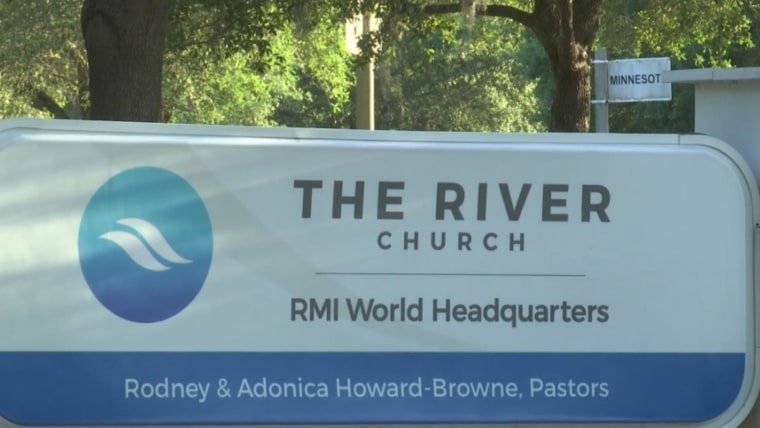A high-profile segment of American Christian leadership has not covered itself in glory, divine or otherwise, during this coronavirus outbreak. Church services globally have been one vector for coronavirus transmission — dozens of cases were linked to a single church in California. But some pastors in the U.S. have been reluctant to close down churches (and, perhaps, forgo weekly donations). Similarly, Jerry Falwell Jr. partly reopened his evangelical Liberty University, putting students, teachers and staff at risk. A Bible study leader for President Donald Trump’s Cabinet even said the virus was God’s wrath.
In short, the coronavirus reaction from leaders in the evangelical Christian community leaves something to be desired.
In short, the coronavirus reaction from leaders in the evangelical Christian community leaves something to be desired. But the Rev. Eric Atcheson’s new book, “On Earth As It Is In Heaven: A Faith-Based Toolkit for Economic Justice,” is a welcome reminder that the Christian church doesn’t have to respond to misfortune with misinformation or callous indifference. Atcheson, the interim family ministries director for First Presbyterian Church in Vancouver, British Columbia, wrote his book before the pandemic emerged. But his argument that Christians should be deeply concerned with economic justice seems even more relevant as businesses close and unemployment skyrockets. Christianity, Atcheson argues, has a tradition of engaging with, and caring about, the most vulnerable. That tradition is as urgent now as it’s ever been.
Get the think newsletter.
Christianity’s engagement with the poor starts with Christ himself, Atcheson argues. Joseph, the husband of Mary, is generally thought of as a carpenter. But “he was probably a day laborer, who made close to the minimum wage of the day,” Atcheson told me. Mary’s son Jesus, during his lifetime, was not a “king of kings,” as the Bible calls him. He was poor.
March 30, 202001:41
Moreover, Atcheson says, “the vast majority of Christians for the vast majority of history have been poor.” In the ancient world, Christians were often a persecuted religious minority. In the Middle Ages, most Christians were peasants, ruled over by a small, wealthy minority. During the Age of Discovery from the 1500s through the 1700s, Christianity was spread by force, and converts were marginalized and enslaved. “We have to be honest about what is taught in our tradition about wealth,” Atcheson told me, “which is that Jesus unequivocally condemns it and that most Christians throughout history have completely lacked it.”
Some Christians throughout history have responded to poverty by advocating for personal charity. Atcheson in his book notes that during the Middle Ages, poverty was seen as ennobling and the wealthy would give beggars alms with the understanding that those beggars were closer to God and could pray for the souls of the almsgivers. This became essentially a justification for poverty; you needed to keep the poor around so they could intercede for the rich.
But, Atcheson told me, the Scriptures do not call for charitable giving. Instead, they are much more radical, demanding a transformation of society. Early Christians gave up all their wealth and created communities where wealth was shared equally by everyone. The Bible, in Atcheson’s view, does not call for charity but for fundamentally changing a system in which some accumulate vast wealth and others go hungry.
Atcheson suggests several things churches can do to address economic inequality in their communities and in the country. He says that pastors should advocate for and support striking workers from the pulpit and that churches can contribute to strike funds. He also notes that some churches have devoted resources to buying medical debt to address and highlight the structural inequality of America’s health care system.
He also suggests that white churches need to recognize Christianity’s complicity in providing justification for policies like native genocide and slavery. The church, he argues, should be at the forefront of the reparations movement. Any white congregation that has enough money to run a successful capital campaign should also set aside money to provide reparations to black or indigenous communities, Atcheson says in his book. A campaign that does not do so, he writes, “is fundamentally incomplete from a theological perspective.”
Under our current conditions, such ambitions are admittedly much harder to achieve. Without services, and with congregants suddenly without jobs, many churches are facing bankruptcy or closure. That’s in part why some pastors have been reluctant to close down services. Conservative pastors have been especially lax in this regard, with partisan politics coloring what should be an apolitical public health crisis. A lot of “prominent white Christianity,” Atcheson says, “has decided to be good Republicans first and good Christians second, or they see the two as synonymous.”
“That’s something that Jesus teaches about, too,” Atcheson told me. “When Jesus talks about himself as the Good Shepherd, the Good Shepherd cares for the sheep and watches out for the sheep. And pastors are going to have to decide what kind of shepherd they are. Because I think to model Jesus in this case is to care for the lives of the people. But some pastors seem not to care whether their congregation lives or dies.”
America is a culture obsessed with success, wealth and power. Former Fox News host Bill O’Reilly said those who had died were “on their last legs” and implicitly too weak or unimportant to mourn. Similarly, Atcheson writes, in his ministry he has often seen people “hastening to justify a person’s poverty because of their personal immorality.” Like Job’s comforters, we like to think that those who are ill or poor have brought their misfortune on themselves and that our own health and success are attributable to our virtue. But the Christian response, Atcheson argues, is not to justify suffering. It is to change an unjust world.



